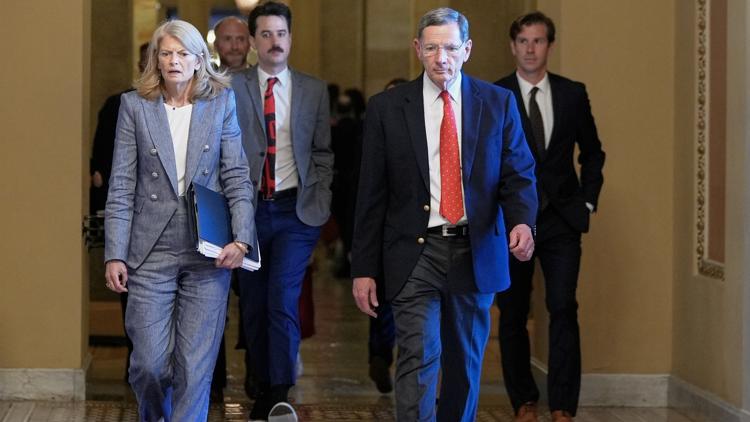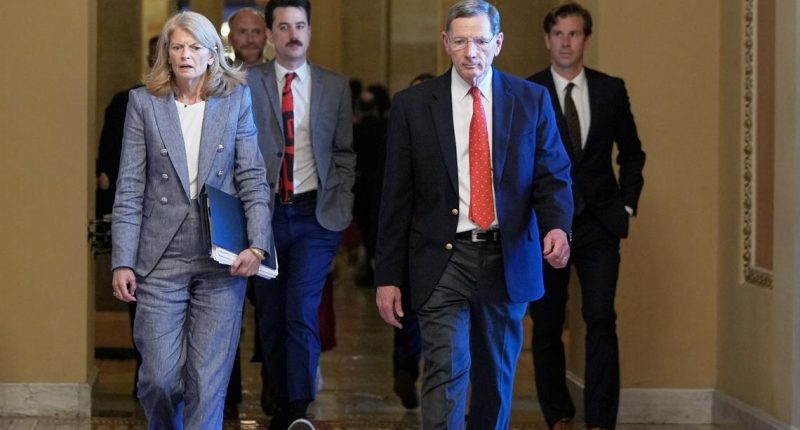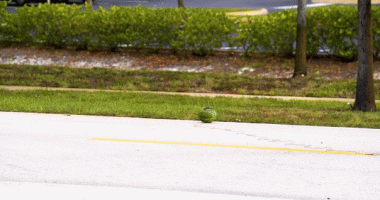Share this @internewscast.com

The 887-page bill that narrowly passed through the Senate — and is now on its way back to the House for potential approval — mentions Alaska 19 times, more than any other state.
WASHINGTON — Just after midnight, Alaska Sen. Lisa Murkowski was pacing in a Senate hallway, alone and looking concerned.
It had become evident to her Republican colleagues that her vote was their best opportunity to pass President Donald Trump’s extensive bill involving tax reductions and spending cuts. When asked if she had decided to support the bill, Murkowski shook her head and signaled with her hand that she was not ready to answer any questions.
Approximately 12 hours later, after persuading Senate leaders to amend the bill to favor her state and voting in favor of the legislation which ensured its passage, Murkowski reflected that the previous day had been “probably the most difficult and agonizing legislative 24-hour period that I have encountered.”
“And you all know,” she told reporters after the vote at midday Tuesday, “I’ve got a few battle scars underneath me.”
This isn’t Murkowski’s first tough vote
Murkowski has been in the Senate for nearly 23 years, and she has taken a lot of tough votes as a moderate Republican who often breaks with her party. So she knew what she was doing when she managed to leverage the pressure campaign against her into several new programs that benefit her very rural state, including special carveouts for Medicaid and food assistance.
“Lisa can withstand pressure,” said Maine Sen. Susan Collins, a fellow Republican moderate and longtime friend. Collins said she spoke to Murkowski on Monday when she was still undecided, and “I know it was a difficult decision for her, and I also know how much thought she put into it.”
Texas Sen. John Cornyn, R-Texas, who has also served with Murkowski for two decades, was more blunt: “She knows how to use her leverage,” he said.
The 887-page bill narrowly passed by the Senate on Tuesday — and now headed back to the House for possible passage — mentions California three times, Texas twice and New York not at all. But Alaska is in the bill 19 times, from new oil and gas lease sales in the state to tax breaks for Alaska fisheries and whalers to tribal exemptions for work requirements.
Even with all the provisions for Alaska, Murkowski was deeply torn up until the hours just before the vote, when the entire Senate was focused on what she would do — and as Republicans were pressuring her to support the bill and move the party one step closer to giving Trump a win.
She had always supported the bill’s tax cuts and extensions, but she had serious concerns about the repercussions of cutting Medicaid in her state and around the country.
She got much of what she wanted
Murkowski eventually decided to support the legislation in the hours after the Senate parliamentarian approved language to allow several states with the worst error rates in the food stamp program — including Alaska — to put off having to pay a greater portion of the cost of federal benefits, and after Republicans added a $50 billion fund proposed by Collins to help rural hospitals that might otherwise be hurt by Medicaid cuts.
Even with the fund included, Collins was one of three Republicans who voted no on the bill, arguing that the cuts to Medicaid and food stamps would hit her small rural state especially hard. But she said she understands why Murkowski would support it and negotiate special treatment for her state. “The fact is, Alaska is unique from every other state,” Collins said.
Nearly one-third of Alaska’s total population is covered by Medicaid, and the state has long struggled with high health care costs and limited health services in many communities. Most Alaska communities are not connected to the state’s main road system, meaning that many residents, particularly those in small, remote villages, need to fly to a larger city for certain kinds of care. Food security is also a longstanding concern, as the remote nature of many communities means food often is barged or flown in, and options can be limited and expensive.
“I had to look on balance, because the people in my state are the ones that I put first,” Murkowski said immediately after the vote. “We do not have a perfect bill by any stretch of the imagination.”
Some of her colleagues who voted against the bill were critical. “They chose to add more pork and subsidies for Alaska to secure that vote,” said Republican Sen. Rand Paul of Kentucky.
Minnesota Sen. Amy Klobuchar, the top Democrat on the Senate Agriculture Committee, which oversees the food stamp benefits, said that the food stamp provision would incentivize states with the worst oversight, which was the opposite of what Republicans originally intended. The provision would “expand the graft,” Klobuchar said.
Lots of eyes have been on Murkowski
Murkowski, often accompanied by Collins, has been under a microscope for almost every major vote in the Senate in recent years. In February 2021, she joined six other Republicans and all Democrats in voting to convict Trump for inciting the Jan. 6, 2021, attack of his supporters on the Capitol after the House impeached him for a second time. In 2018, she opposed the confirmation of Supreme Court Justice Brett Kavanaugh amid sexual misconduct claims, ultimately voting “present.”
So as Murkowski was wooed for days by Republican leaders and many of her colleagues to vote for the tax and spending cuts package, it was somewhat familiar territory — and an ideal environment for her to win some concessions in favor of her state.
On Monday evening and early Tuesday, Senate Majority Leader John Thune, R-S.D., and Sen. John Barrasso of Wyoming, the No. 2 Senate Republican, spent hours on the Senate floor talking to Murkowski — who was sometimes wrapped in a blanket to stay warm in the frigid chamber. Alaska Sen. Dan Sullivan, a Republican, would sometimes join the group, as did Senate Budget Committee Chairman Lindsey Graham, R-S.C.
As she mulled her vote, Murkowski sorted through drafts of amendments and talked to aides. And despite longstanding criticism of Trump, she communicated with White House officials who made the case that the measure would ultimately be a positive for her state and constituents.
Thune had said for weeks that he would hold a vote as soon as he had 51 senators supporting the legislation. And after days of delays, it became clear Tuesday morning that Murkowski had decided to support it when Thune told senators to come to the floor and scheduled a vote within the hour.
Murkowski, still looking a bit worried, voted “aye.” After the vote, she said: “I haven’t slept in a long, long while now.”
Bohrer reported from Juneau, Alaska. Associated Press reporters Seung Min Kim and Josh Boak in Washington contributed to this report.
Copyright 2025 Associated Press. All rights reserved. This material may not be published, broadcast, rewritten, or redistributed.
















